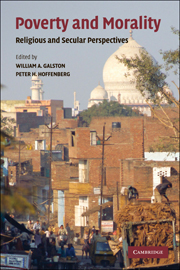Book contents
- Frontmatter
- Contents
- Contributors
- Acknowledgments
- 1 Introduction
- 2 Global Poverty and Unequal Development
- 3 The Karma of Poverty
- 4 Poverty and Morality in Christianity
- 5 Classical Liberalism, Poverty, and Morality
- 6 Confucian Perspectives on Poverty and Morality
- 7 Poverty and Morality
- 8 Hinduism and Poverty
- 9 The Problem of Poverty in Islamic Ethics
- 10 Jewish Perspectives on Poverty
- 11 Liberal Egalitarianism and Poverty
- 12 Marxism and Poverty
- 13 Poverty and Natural Law
- 14 Afterword
- Select Bibliography
- Index
- References
2 - Global Poverty and Unequal Development
Contemporary Trends and Issues
Published online by Cambridge University Press: 05 June 2012
- Frontmatter
- Contents
- Contributors
- Acknowledgments
- 1 Introduction
- 2 Global Poverty and Unequal Development
- 3 The Karma of Poverty
- 4 Poverty and Morality in Christianity
- 5 Classical Liberalism, Poverty, and Morality
- 6 Confucian Perspectives on Poverty and Morality
- 7 Poverty and Morality
- 8 Hinduism and Poverty
- 9 The Problem of Poverty in Islamic Ethics
- 10 Jewish Perspectives on Poverty
- 11 Liberal Egalitarianism and Poverty
- 12 Marxism and Poverty
- 13 Poverty and Natural Law
- 14 Afterword
- Select Bibliography
- Index
- References
Summary
Questions about global poverty and inequality inspire some of the most contentious debates not only among academics but also among politicians and the public at large. People look to data on poverty and inequality as they might a stock market index to gauge how the world is doing. Are things on the right track? Is enough being done? In this age of globalization, the question is inevitably about whether “globalization” brings prosperity and, if so, is it prosperity for just a few or is it widely shared. Is it just material prosperity or a more meaningful set of life choices for people?
The aim of this introductory chapter is to assess recent empirical trends on poverty and inequality, with a focus on human well-being rather than on income alone as a measure of well-being. It argues that the past decade was one of unprecedented progress for some but stagnation and reversal for others and that there is a growing gap among developing countries as well as among all countries of the world.
Keywords
- Type
- Chapter
- Information
- Poverty and MoralityReligious and Secular Perspectives, pp. 15 - 43Publisher: Cambridge University PressPrint publication year: 2010
References
- 1
- Cited by

